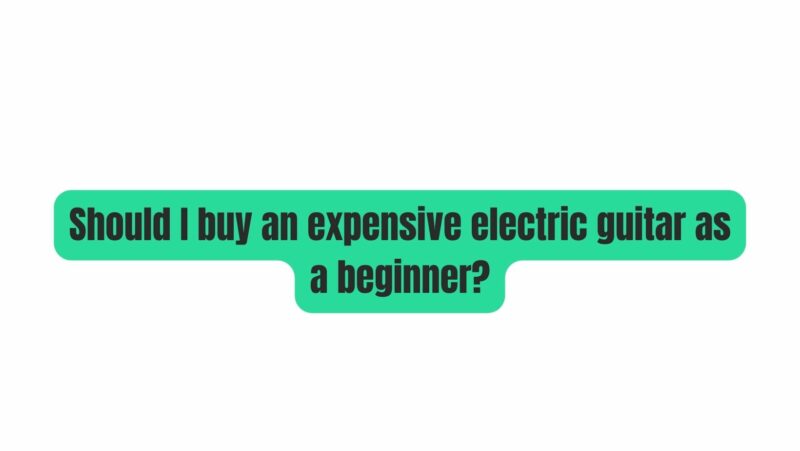Starting your journey as a beginner electric guitarist is an exciting step toward musical expression and creativity. As you embark on this path, you’ll face a fundamental decision: whether to invest in an expensive electric guitar from the outset or begin with a more affordable option. In this comprehensive guide, we will explore the pros and cons of buying an expensive electric guitar as a beginner to help you make an informed decision that aligns with your goals and budget.
The Beginner’s Dilemma
Before we delve into the factors to consider, it’s essential to acknowledge the common dilemmas faced by beginners:
- Budget Constraints: Many beginners are working within a limited budget, often unsure about how long their interest in playing the guitar will last. This can make investing in an expensive instrument seem impractical.
- Quality vs. Budget: Beginners may wonder if an expensive guitar will significantly enhance their learning experience and playing ability, or if they can achieve similar results with a more affordable option.
- Long-Term Commitment: Beginners may not be certain how committed they will be to learning the guitar in the long run. The fear of purchasing an expensive guitar only to lose interest can be a concern.
Pros of Buying an Expensive Electric Guitar as a Beginner
- Quality Build: Expensive electric guitars are typically crafted with high-quality materials and craftsmanship. This can translate to a better overall playing experience, including comfortable neck profiles, smooth fretwork, and excellent intonation.
- Improved Playability: Higher-end guitars often feature advanced hardware and setups, making them easier to play and providing a more enjoyable learning experience. This can be especially beneficial for beginners who may find it more challenging to play on less expensive guitars with subpar setups.
- Enhanced Tone and Versatility: Expensive electric guitars often come equipped with superior pickups and electronics. This can result in a broader tonal range, allowing you to explore various musical genres and styles as you progress.
- Resale Value: Should you decide to upgrade or change your guitar in the future, expensive guitars tend to hold their value better than budget instruments. This can be a financial advantage if you choose to sell or trade your guitar.
Cons of Buying an Expensive Electric Guitar as a Beginner
- Initial Cost: The most significant drawback is the initial cost. Expensive electric guitars can put a strain on your budget, potentially limiting your ability to purchase essential accessories such as amplifiers, tuners, and instructional materials.
- Lack of Experience: As a beginner, you may not yet have the experience and discernment to fully appreciate the nuances of a high-end guitar. You may not be able to maximize its capabilities until you develop your playing skills.
- Risk of Loss of Interest: There’s always a possibility that your interest in playing the guitar may wane over time. Investing a substantial amount in an expensive guitar may not be justifiable if you don’t foresee a long-term commitment to the instrument.
- Maintenance and Repairs: Expensive guitars may require more meticulous care and maintenance. The cost of repairs and upkeep can be higher, which may not be suitable for beginners who are still learning to handle their instruments.
Considerations for Making Your Decision
When deciding whether to buy an expensive electric guitar as a beginner, consider the following factors:
- Budget: Assess your budget carefully and determine how much you are willing and able to invest in your first electric guitar. Be mindful of the additional costs of accessories and lessons.
- Goals and Commitment: Reflect on your long-term goals and commitment to learning the guitar. If you envision a dedicated and sustained musical journey, investing in a higher-quality instrument may be a worthwhile choice.
- Playability: Test out guitars in different price ranges to assess playability and comfort. A guitar that feels good to play can greatly enhance your learning experience.
- Research and Reviews: Read reviews and seek advice from experienced guitarists and music teachers to gain insights into specific guitar models within your budget.
- Accessories and Learning Resources: Remember that an electric guitar is just one part of the equation. Allocate a portion of your budget for essential accessories like an amplifier, tuner, cables, and instructional materials.
- Consider Used Instruments: Don’t rule out the option of purchasing a used high-quality guitar. This can significantly reduce the initial cost while still providing you with a superior instrument.
Conclusion
While buying an expensive electric guitar as a beginner can offer advantages in terms of build quality, playability, and tonal capabilities, it’s essential to balance these benefits with your budget and long-term commitment to the instrument. A more affordable guitar that suits your current financial situation may be a practical choice, allowing you to invest in additional accessories, lessons, and learning resources. Ultimately, the decision should align with your goals, preferences, and the resources at your disposal. As you progress in your guitar-playing journey, you can always consider upgrading to a more expensive instrument when your skills and appreciation for guitar quality have matured.


